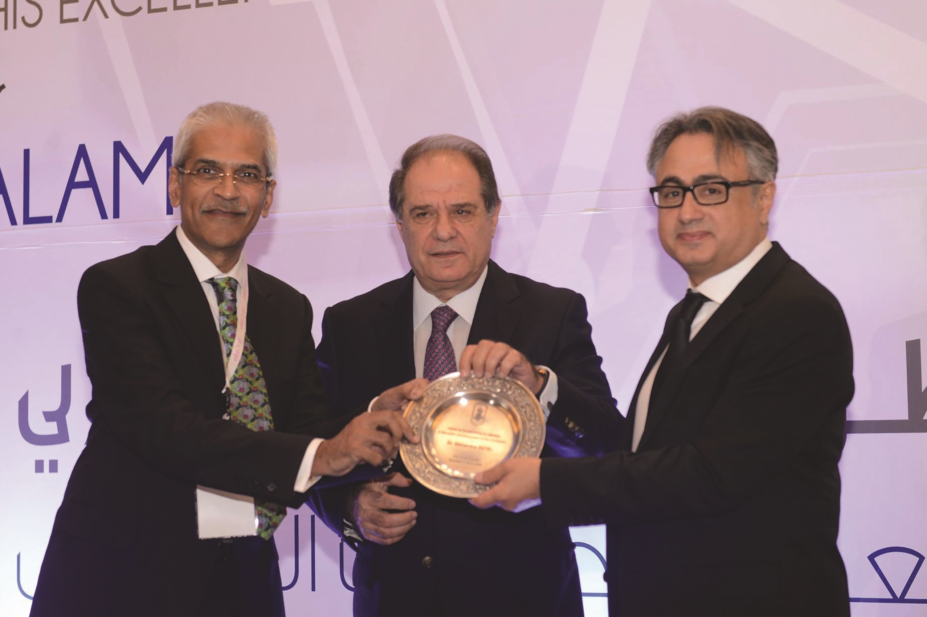
I was delighted to be invited to represent the UK pharmacy profession, the Royal Pharmaceutical Society (RPS), and the University of Huddersfield at The Lebanese Order of Pharmacists (OPL) and its 24th Annual Congress “Advancing pharmacist’s role: together we make a difference”.
It was fascinating to see how the OPL functioned in leading the Lebanese pharmacy profession by endeavouring to uphold government-driven legislative practice against clear difficulties and challenges.
The OPL and its scientific committee demonstrate a clear passion and determination to deliver pharmacy practice safely, effectively, and legally throughout Lebanon. Furthermore, it is keen to share and promote good practice throughout the Arab countries, including Egypt, Jordan, Morocco, Syria, Iraq, Qatar, to name but a few. All were well represented at the congress by their respective presidents and the chairs of their professional and governing bodies, alongside senior pharmacists from clinical and academic sectors as well as community. In total, more than 1,800 pharmacists, who were largely Arabic, English, and French speaking, attended.
However, worryingly it seems that throughout Lebanon there is a large disconnect and variable understanding in the importance of providing a safe and legal service through pharmacy – a precursor for fatalities. This was surprising and difficult for me to comprehend, especially noticing that the attendees on the whole appeared to be enthusiastic and engaged with the educational contents of the congress. Perhaps this may have been due to the large number of ‘easy’ continuing education credits on offer? A minimum of 15 credits annually is necessary as part of the pharmacist’s mandatory requirement for continuous professional development within Lebanon.
Contrastingly, in some of the other Arab countries there is no regulatory need for continuous education
Lebanon has no national health service, therefore the cost of obtaining services plays a big part in decision-making. For example, bypassing the doctor to obtain prescription medicines is much cheaper as it cuts out the ‘middle man’.
Furthermore, pharmacy is practised with little or no regard to observing legislation across all sectors. The OPL battles continuously against this as it tries to lead the profession forward and provide support to its members to practise safely and legally at all times. Unfortunately the OPL lack the appropriate resources and skills to do so effectively. Many pharmacists openly provide intra-muscular injections without any restriction nor undergo any formal accredited training – and alarmingly have been doing so for many years. Antibiotics are freely available through the government appointed community dispensaries as part of everyday normal practice. Is this contributing to global antibiotic resistance, I ask myself.
Interestingly, everything apart from scheduled drugs can be purchased without a prescription. Pharmacy dispensaries invariably operate without a pharmacist yet supply medicines to patients. Furthermore, there is no over-the counter listing for medicines as such. Vaccinations stored in the dispensaries within the community setting and in GP surgeries may not always meet the standards and policy required for maintaining the vaccine cold chain. Once again practice contravening the requirements set by law.
Moving over to the hospital sector, often a single pharmacist is responsible for looking after a ward of up to 100 beds supported only by lesser qualified or even, non-qualified personnel.
It is against these challenges that, as a professional body, the OPL constantly strives towards reviewing and changing government legislation in the best interest of the patient and healthcare provision.
Showcasing the RPS
I was honoured to present two talks to a delegation of more than 1,000 pharmacists in the presence of the minister of health and the prime minister’s team of representatives. One of my talks showcased how we, at the RPS, endeavour to reach out to our members to support and equip them to deal with the growing challenges and demands of the NHS. The other talk comprised of promoting our new models of care and the rapidly changing roles of pharmacists in line with the clear evidence of improved health benefits. Naturally, both highlighted the importance of practising legally and safely – at all times, and in all settings.
Personally the congress provided an eye-opening but also worrying insight of pharmacy in Lebanon. No implementation of legislation relating to the practice of pharmacy, no prima facie consideration for patient safety, nor any evidence of structured continuous professional development. The profession wants to change this, and quickly.
It is therefore extremely uplifting to discover that the president of the OPL together with its scientific committee are now actively looking towards the RPS to provide appropriate advice and support to help address some of these concerns. As a priority, they want to access a respected and trusted system of accredited programmes with professional recognition – similar to that offered by the RPS through its Faculty and Foundation programmes. The OPL are also driven to producing a pharmacy workforce that is suitably equipped and competent in their delivery so that it can be confident that the service its members provide is legal, safe, and always of a high standard.
It is not surprising that this visit to Lebanon has sparked further interest from Jordan, Iraq and Morocco, who are now also looking towards showcasing our profession and the RPS at their respective national pharmacy conferences. There is clear potential for collaboration between the RPS and the Arab countries and to lead the way forward internationally in this manner.
I have always been proud of my profession, but this relationship with Lebanon has made me more appreciative of the values my own profession and the vision of the RPS. I am always honoured to fly the flag for the RPS and the NHS, irrespective of which country I happen to be in.


